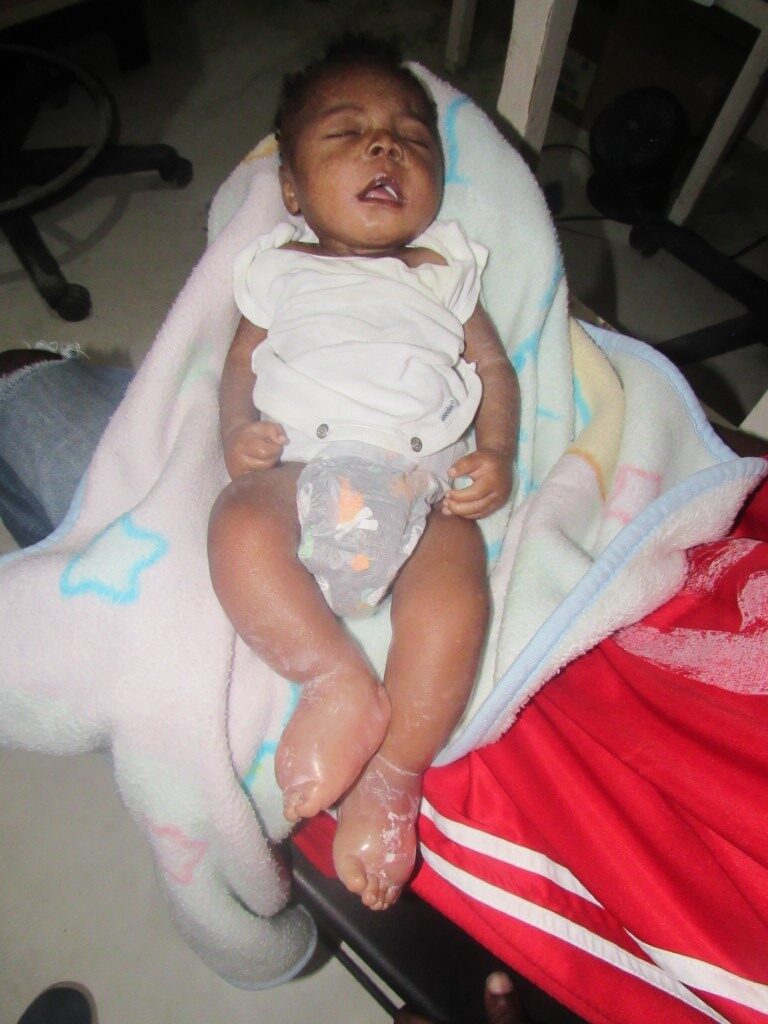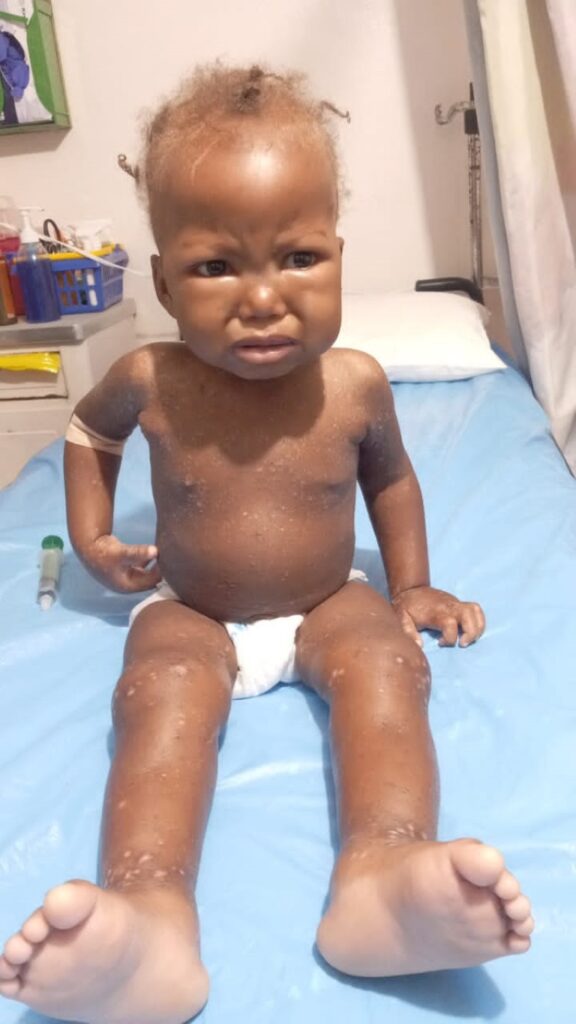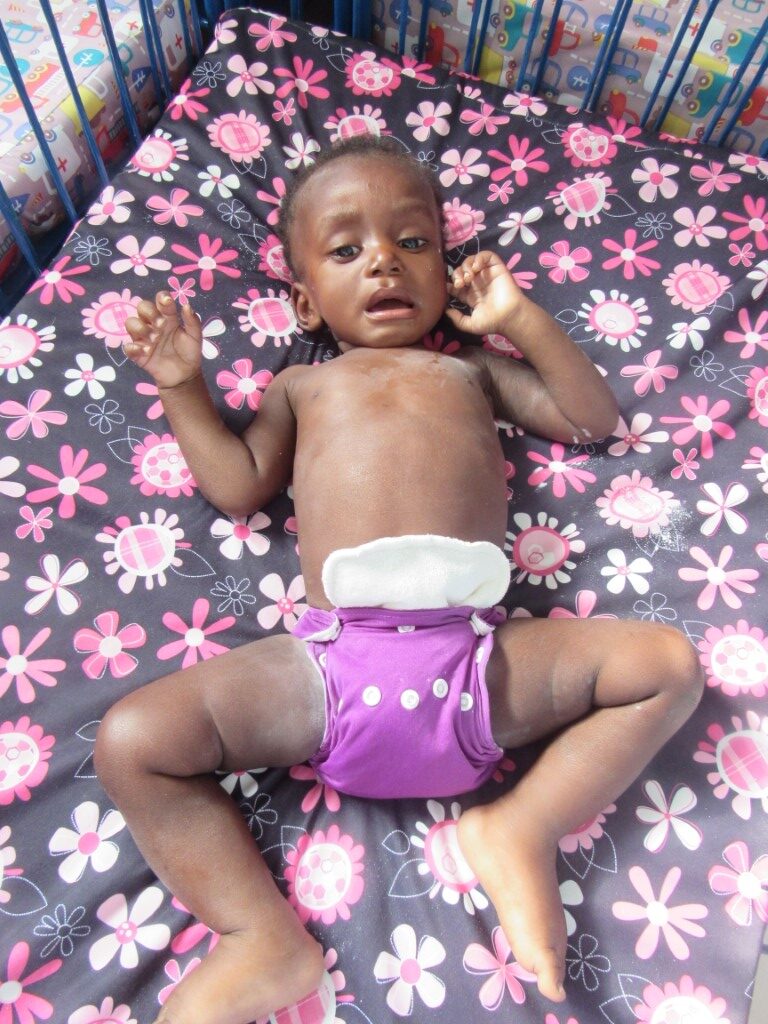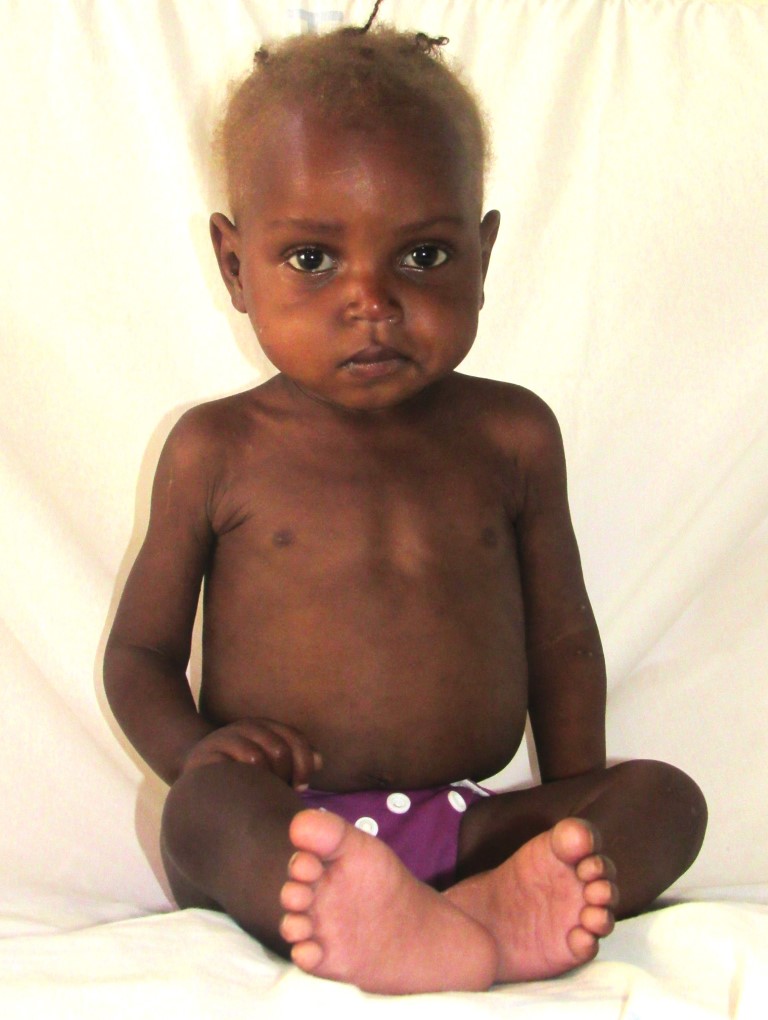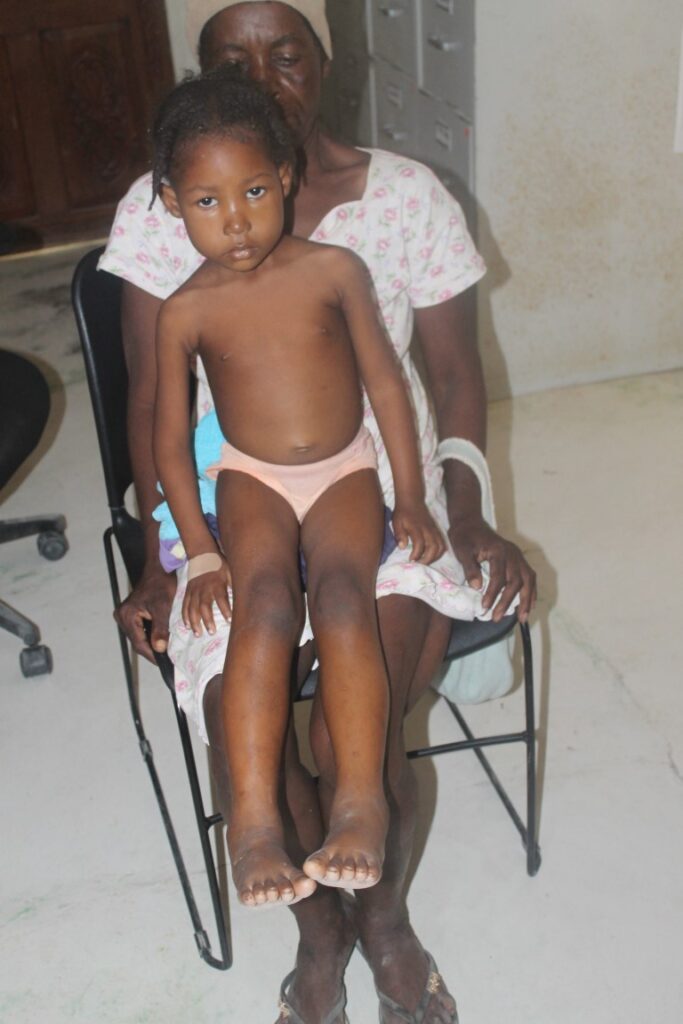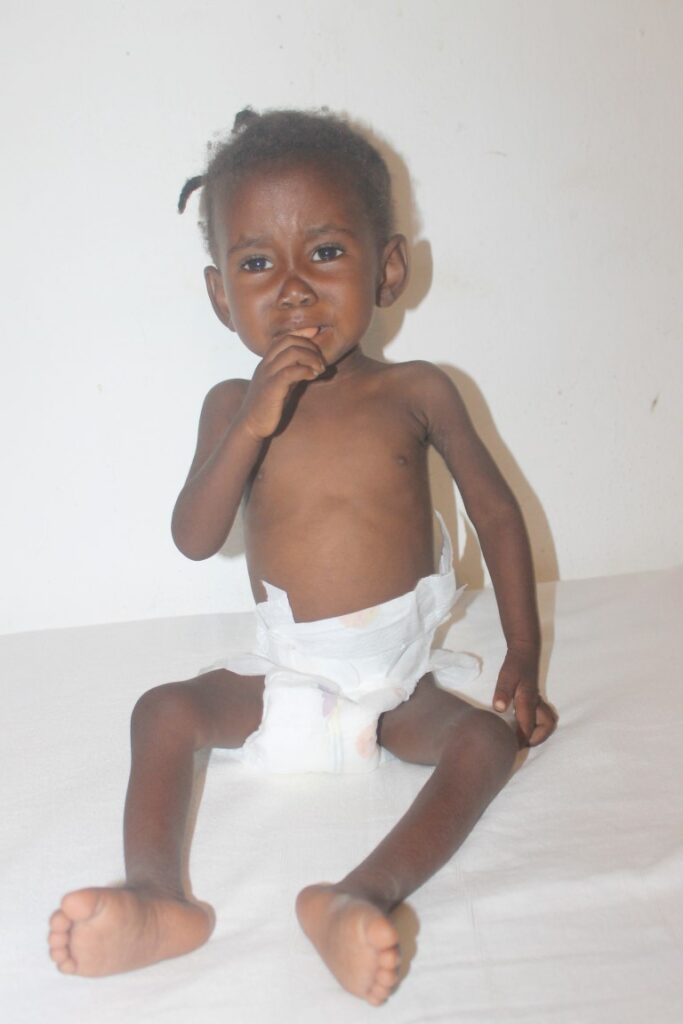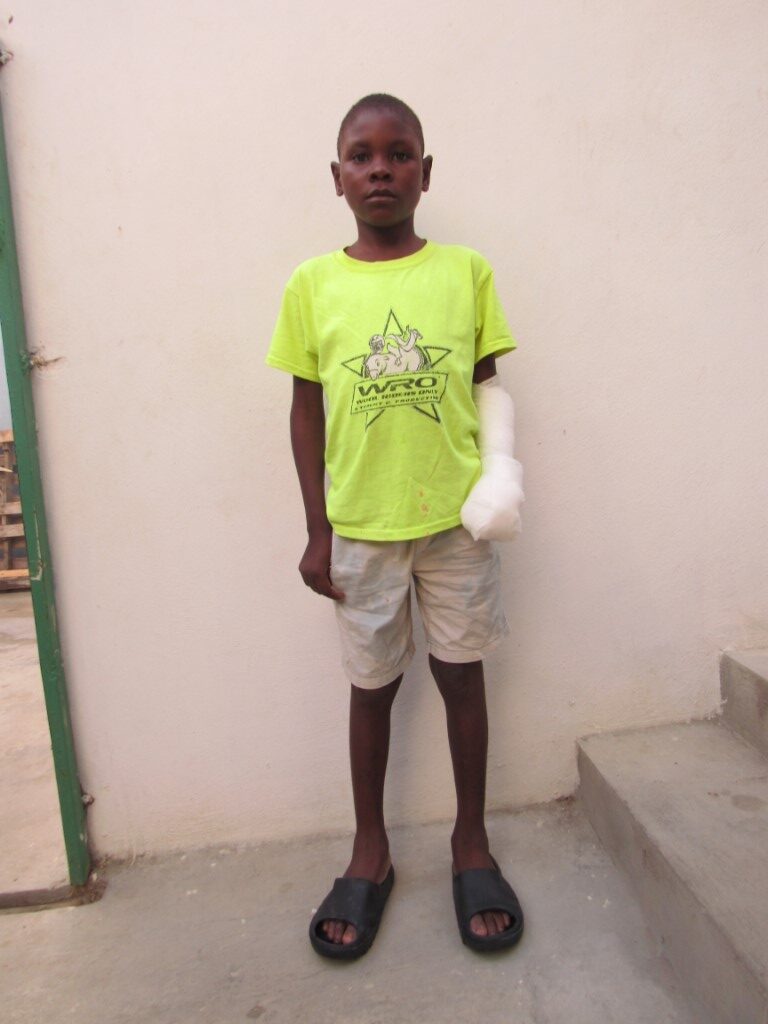Rayens is a young boy who resides with his family in a small, one-room house made of cinder blocks and topped with a tin roof. His family consists of his parents, who work tirelessly to make ends meet, and his sister. Rayen’s father is a woodworker, while his mother purchases items in bulk to resell. They sell drinking water from their home, but they do not have access to running water or a flush toilet. Instead, they use an outhouse. Unfortunately, Rayens became ill when his mother could not produce enough breast milk to feed him, and he began displaying symptoms of kwashiorkor about two weeks before being admitted. They sought medical assistance at a local hospital, but were unable to afford the necessary care. As a result, they decided to come to Cazale. Currently, Rayens weight-to-height ratio was-4 standard deviations, indicating severe malnutrition. To treat his condition, Rayens was given F-100 therapeutic milk and later transitioned to medika mamba when he reached six months of age.
Mislene resides in a four-room residence constructed of rocks and clay, topped with a tin roof, along with her family. Her family consists of her mother and father, both of whom are farmers, as well as one brother and two sisters, plus one sibling who has passed away. The family grows beans and corn in their garden, which they harvest by hand and sell for a profit at open-air markets. They do not have access to running water or a flush toilet, but they do have an outhouse. The family obtains their water from a piped system, which is around a ten-minute walk from their house. Mislene came down with a fever and cold, which subsequently developed into symptoms of kwashiorkor, leading her to seek medical attention at the clinic. Additionally, she was severely anemic. Her mother, who is currently five months pregnant, is staying with her during her recovery period. Despite traveling three hours by motorcycle and foot to reach the clinic, Mislene’s weight-to-height standard deviation is -4. She began receiving F-75 therapeutic milk and then graduated to medika mamba.
Gaby and his family live in a modest one-room home constructed of cinder block and topped with a tin roof. The family consists of Gaby, his brother, his sister, and his parents. His father works as a woodworker while his mother stays home to care for the children. While they do not have access to running water or a flush toilet, they do have an outhouse. They collect their water from a hand pump that is approximately a 15-minute walk from their home. Recently, Gaby became unwell with fever and vomiting, and began to exhibit symptoms of kwashiorkor. About one month before he fell ill, his mother stopped breastfeeding him due to her own illness. Gaby’s family travelled by motorcycle and on foot for one hour to reach the clinic. Gaby’s weight-to-height ratio is at -4 standard deviations. At the clinic, he began treatment with F-75 therapeutic milk before transitioning to medika mamba.
Danica resides with her aunt in a modest two-room abode constructed from rocks, clay, and topped with a tin roof. With the recent passing of her mother, she now lives with her father’s sister, and has no siblings. Her family makes a living as farmers, growing beans, corn, and spinach in their garden. They meticulously harvest these crops by hand and sell them at open-air markets for a profit. The family does not have access to running water or a flush toilet, but they do have an outhouse. They have to walk for two hours to reach a water source that bubbles from the ground. Recently, Danica became ill and experienced stomachache, diarrhea, and vomiting, which ultimately resulted in her developing signs of kwashiorkor. She went to a local clinic, and after they realized the severity of her case, they referred her to our clinic. The family had to endure an 11-hour journey on motorcycle, taxi, and foot to reach the clinic. Danica’s weight-to-height ratio is minus one standard deviation, which, combined with her kwashiorkor, makes her a severe case. She was initially given F-75 therapeutic milk and then graduated to medika mamba.
Saviola lives with her mother and grandmother in a one-room house made of rocks and clay with a tin roof. She has one sister and one brother, and her family cultivates bananas and beans, which they sell at open-air markets. They do not have access to running water or a flushing toilet, but they do have an outhouse. The piped water system is a 30-minute walk from their home. Saviola fell ill with a fever and cough and later developed kwashiorkor, two weeks before arriving at the clinic. The family traveled for three hours by motorcycle and foot to reach the clinic. Saviola’s weight to height ratio is -3 standard deviations, and coupled with her kwashiorkor, she is considered a severe case. She received F-75 therapeutic milk and later graduated to Medika Mamba.
Marie Louise and her family reside in a three-room house constructed of cinder blocks and a tin roof. Her siblings consist of two brothers and one sister, and they come from a farming background, specializing in the growth of bananas, tomatoes, and papaya. The crops are cultivated by hand and then sold at open-air markets for a profit. They don’t have access to running water or a flush toilet, but they do have an outhouse. To obtain water, they walk approximately an hour to an irrigation ditch. Marie Louise’s health began to deteriorate with symptoms of fever, coughing, and diarrhea two weeks before her arrival at the clinic. The family traveled on foot and by motorcycle for an hour to reach the clinic. Her weight-to-height ratio is -4 standard deviations, indicating a severe case. She was given F-75 therapeutic milk and later transitioned to medika mamba.
Junior suffered an arm injury after falling off an animal near his home. Seeking help, they went to a local herbalist who wrapped his arm too tightly. After several days, his finger turned black and they rushed him to the clinic. The finger was severely infected and he was transferred to a larger hospital, where they had to amputate the finger. The hospital being five hours away from their home, they recommended daily wound care, which was not feasible for the family. As a result, Junior is staying with us for wound care before returning home with his family.


